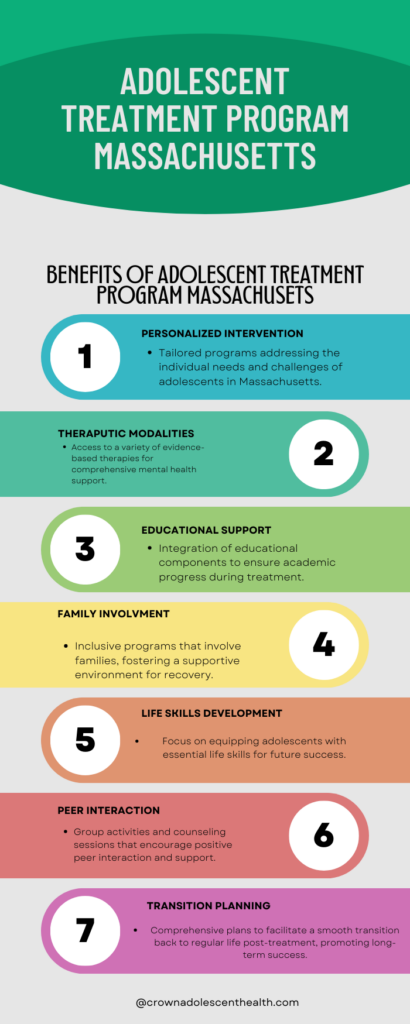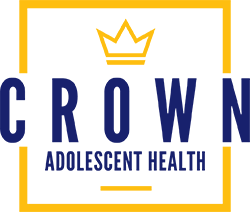Did you know that around 20% of teenagers could go through a tough time with their mental health in a year? What’s interesting is that about half of all mental health issues start showing up by the time a person hits 14, and a whopping 75% make their entrance by the age of 24. So, it’s like, our early years play a big role in shaping our mental well-being.
Adolescence can be a rollercoaster ride of changes, both physically and emotionally. Let’s see how we can support our young people effectively. From understanding the ups and downs of this developmental stage to exploring different treatment programs available, the focus is on providing holistic support. The goal is to address mental health issues and promote overall well-being, involving families, schools, and communities.
Navigating Teenagers' Emotional Well-being And Adolescent Treatment Program in Massachusetts
Anxiety
Constant worrying, fear, and physical symptoms like a super-fast heartbeat, sweating, and struggling to breathe. Almost one in five Massachusetts teens go through this, dealing with anxiety disorders. Anxiety disorders aren’t just passing worries or occasional nerves before a big test. They’re persistent, and intrusive, and can significantly impact daily life. For these Massachusetts teens, it means dealing with a mental and physical rollercoaster, where the fear of the unknown becomes a constant companion.
Depression
Ever felt an unexplainable sadness, hopelessness, or suddenly losing interest in things you used to love? Well, about one in ten teenagers in Massachusetts grapple with depression. It can affect various aspects of a person’s life, including their relationships, school performance, and overall well-being. Teenagers might find it challenging to express their emotions or seek help due to societal stigma or not fully understanding what they’re going through. Parents, teachers, and peers must be aware of these struggles and provide support.
Eating Disorders
Some teens find themselves caught up in unhealthy eating habits and a distorted view of their bodies. Shockingly, it’s estimated that around 20% of high school girls in Massachusetts are dealing with eating disorders.
Substance Abuse
Then there’s the tricky territory of turning to alcohol, drugs, or other substances to deal with tough emotions or situations. Here in Massachusetts, about 16% of high school students admit to using alcohol. This behavior can stem from various factors, such as peer pressure, stress, or a lack of healthier coping mechanisms. It’s crucial to understand that relying on substances for emotional relief can have serious consequences
Suicidal Thoughts
Perhaps one of the most alarming challenges is when teens start thinking about or planning to end their own lives. Shockingly, nearly one in five Massachusetts girls and one in ten boys have seriously considered suicide. If you or an adolescent you know is facing such challenges, you shouldn’t delay seeking crisis intervention at all – call 888.557.1552 immediately!
These are some heavy challenges our teens are facing, and understanding them is the first step towards finding the right support and solutions. Encouraging open discussions about mental health is essential in fostering a supportive environment.
A Crucial Lifeline for Adolescent Mental Health
Navigating the chaotic years of adolescence is like riding an emotional rollercoaster, with social pressures and academic stresses thrown into the mix. While it’s normal for teens to experience some ups and downs, for others, these challenges can snowball into overwhelming mental health struggles. That’s where early intervention becomes a reason for hope.
Recognizing Signs of Distress
Early intervention is all about spotting the signs that a teenager might be dealing with mental health issues. Keep an eye out for big shifts, like withdrawing from friends, becoming unusually irritable, or sudden changes in sleep or eating habits. If there’s a sudden drop in grades or a lack of interest in schoolwork, it could be a red flag that something deeper is going on. Unexplained aches, pains, fatigue, or changes in eating habits may be indicative of underlying mental health concerns. Pay attention if a teenager becomes unusually withdrawn or reluctant to talk about their feelings.
The Impact of Timely Intervention
Early intervention is not just about catching problems early; it’s about building resilience and paving the way for a healthier future. Catching issues early allows for intervention before they get worse, making treatment more effective and potentially shorter. Unaddressed mental health issues can become chronic, affecting every aspect of a teenager’s life. Early intervention can help prevent this. By giving teens the tools to manage their emotions and face challenges, early intervention empowers them to cope effectively. Early intervention often involves family therapy and education, creating a stronger support network around the teenager.
Prevention Strategies
Prevention is the name of the game, and taking proactive measures can significantly reduce the risk of mental health problems in adolescents. Foster a safe space for honest conversations about mental health to build trust and understanding. Strong, supportive connections with family, friends, and mentors act as a buffer against stress and anxiety. Encourage regular exercise, healthy eating, and enough sleep, as they contribute significantly to overall well-being. Teach teens healthy coping mechanisms for managing stress, such as mindfulness techniques or relaxation exercises. If you’re concerned about a teenager’s mental health, don’t hesitate to seek professional help. Getting help early can change things for the better.
Remember, each step we take in recognizing, intervening, and preventing mental health challenges in adolescents contributes to a brighter and more resilient future for our youth.

Counseling and Psychotherapy In Adolescents’ Treatment Program Massachusetts
Getting through the wild ride of being a teenager is a big deal, and that’s where counseling and therapy come in like the real heroes. Emotions are all over the place, there’s this pressure to fit in, and you’re trying to figure out who you are. No wonder teens sometimes struggle with mental health stuff. Now, the cool part is how counseling and therapy can be customized, to a perfect fit for each person. It’s not a one-size-fits-all thing. Maybe you need a safe space to understand yourself better, or you’re dealing with feeling worried or down.
The magic happens when therapists make it all about you, tailoring their help to what you specifically need. It’s like creating a personalized map to guide you through the ups and downs of being a teenager.
However, when it comes to the well-being of your teens, Consulting Crown Adolescent Health is like having a trusted ally in the journey of adolescence. We understand that these years can be filled with too many unexpected highs and lows, with emotional twists and turns, social pressures, and academic challenges. Our team at Crown Adolescent Health specializes in recognizing the signs of distress, providing that crucial lifeline for adolescents dealing with mental health issues.
Conclusion
In conclusion, adolescence is a challenging yet crucial period marked by significant physical, emotional, and social changes. The statistics reveal the prevalence of mental health challenges among teenagers in Massachusetts, emphasizing the urgency for comprehensive approaches to support their well-being. Navigating these complexities requires a multifaceted strategy, from early intervention and recognizing signs of distress to personalized counseling and psychotherapy.
Understanding the heavy challenges faced by teens, such as anxiety, depression, eating disorders, substance abuse, and suicidal thoughts, underscores the importance of creating an environment that encourages open conversations about mental health. Early intervention serves as a vital lifeline, allowing for timely support and preventing long-term consequences.

